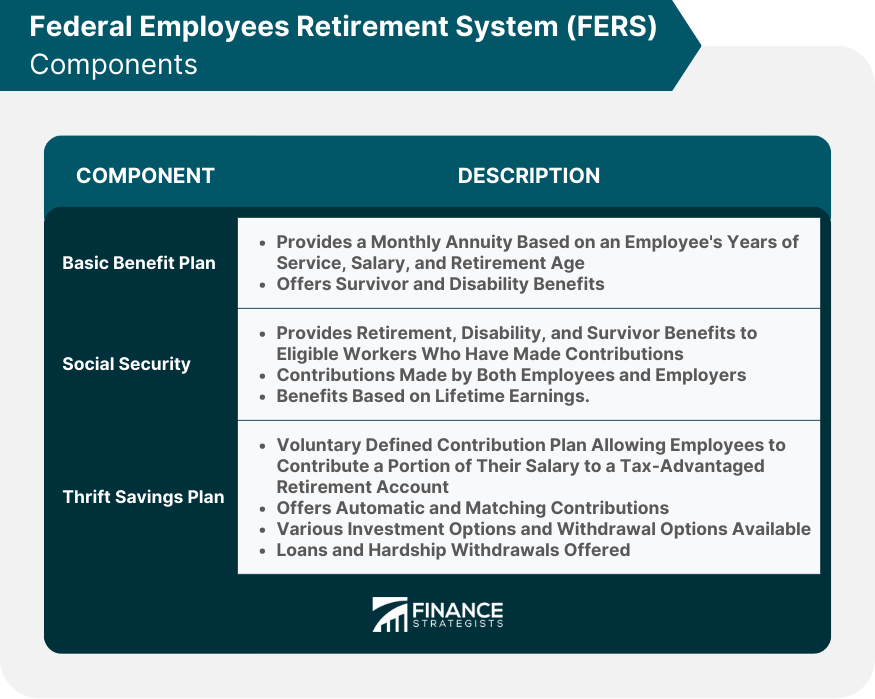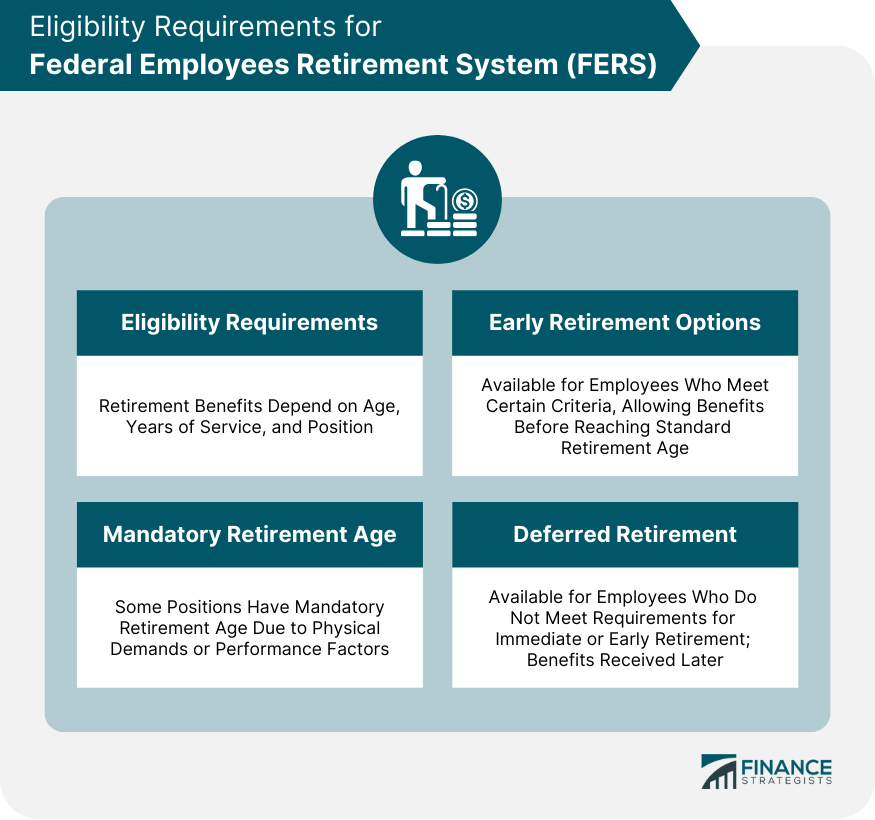The Federal Employees Retirement System (FERS) is a retirement program for United States government employees, designed to provide a comprehensive package of retirement benefits to ensure financial security in their post-career years. FERS was established in 1986 to replace the Civil Service Retirement System (CSRS), with the intent to provide a more flexible and portable retirement system for federal employees, reflecting the changing needs and expectations of the modern workforce. FERS is a three-tiered system comprising the Basic Benefit Plan, Social Security, and the Thrift Savings Plan, which together provide a well-rounded retirement package for federal employees. The Basic Benefit Plan is a defined benefit plan for which most federal employees are automatically enrolled, providing a monthly annuity based on the employee's years of service, salary, and retirement age. Employees contribute a percentage of their salary to the Basic Benefit Plan, while their employing agency also makes a contribution on their behalf, ensuring adequate funding for future benefits. Benefits under the Basic Benefit Plan are calculated using a formula that considers the employee's highest average salary over a consecutive three-year period, years of service, and age at the time of retirement. In the event of an employee's death, the Basic Benefit Plan provides survivor benefits to eligible spouses and dependents, offering financial protection and support to surviving family members. The Basic Benefit Plan offers disability benefits to employees who become unable to work due to a qualifying medical condition, providing a continued source of income during their time of need. As part of FERS, federal employees participate in the Social Security program, making regular contributions from their earnings to qualify for a range of benefits, including retirement, disability, and survivor benefits. Both employees and employers contribute a set percentage of the employee's wages to Social Security, ensuring the program remains adequately funded to provide benefits for current and future recipients. Upon reaching retirement age, employees who have contributed to Social Security become eligible for monthly retirement benefits, calculated based on their lifetime earnings and adjusted for inflation. Social Security also offers disability benefits to eligible workers who become unable to work due to a qualifying disability, as well as survivor benefits to the spouses and dependents of deceased workers, providing important financial support during difficult times. The TSP is a voluntary defined contribution plan that allows employees to contribute a portion of their salary to a tax-advantaged retirement account, with the option to receive agency automatic and matching contributions. Employees can elect to contribute a percentage of their salary to their TSP account, up to annual contribution limits set by the Internal Revenue Service (IRS). Regardless of whether employees contribute to the TSP, their employing agency will make automatic contributions equal to 1% of the employee's salary. In addition to automatic contributions, agencies also provide matching contributions for employees who participate in the TSP, up to a specified percentage of the employee's contributions. TSP participants have several investment options available, including a range of index funds and a lifecycle fund that automatically adjusts its asset allocation based on the participant's age and projected retirement date. Upon reaching retirement age or separating from federal service, TSP participants have various withdrawal options, including lump-sum payments, monthly payments, or purchasing an annuity to provide a steady The TSP allows participants to take loans from their account for certain purposes or to make financial hardship withdrawals in the event of an immediate and significant financial need, subject to certain conditions and restrictions. Eligibility for FERS retirement benefits depends on the employee's age and years of service, with different requirements for immediate, early, and deferred retirement, as well as for employees in specific positions or under special provisions. Some federal positions, such as law enforcement officers, firefighters, and air traffic controllers, have a mandatory retirement age, typically due to the physically demanding nature of the job or other factors affecting performance. Under certain conditions, such as during workforce restructuring or under special provisions, employees may be eligible for early retirement, allowing them to begin receiving benefits before reaching the standard retirement age. Employees who leave federal service before meeting the age and service requirements for immediate or early retirement may be eligible for deferred retirement, which allows them to begin receiving benefits at a later date. An immediate annuity provides a monthly benefit to eligible employees who meet the age and service requirements for standard FERS retirement, ensuring a reliable source of income throughout retirement. A deferred annuity allows employees who separate from federal service before meeting the standard retirement requirements to receive monthly benefits starting at a later date, typically after reaching a specific age. If an employee chooses to retire early, their Basic Benefit Plan annuity may be subject to a reduction based on the employee's age and years of service, which can affect the overall value of their retirement benefits. In addition to FERS benefits, federal employees also receive Social Security benefits upon retirement, providing an additional source of income based on their earnings history and adjusted for inflation. Upon retirement, TSP participants can access the funds in their account through various withdrawal options, allowing them to tailor their retirement income strategy to their individual needs and preferences. To help maintain the purchasing power of retirement benefits, FERS annuities and Social Security benefits are subject to COLAs, which are periodic increases based on changes in the Consumer Price Index for Urban Wage Earners and Clerical Workers (CPI-W). FERS includes special provisions for law enforcement officers, firefighters, and air traffic controllers, recognizing the unique nature of their work and offering enhanced retirement benefits, such as earlier retirement eligibility and higher annuity calculations. Military reserve technicians, who serve as civilian employees in the Department of Defense, are also covered by FERS and may be eligible for additional benefits or retirement options due to their dual civilian and military roles. Members of Congress and certain congressional employees participate in FERS, with some modifications to the standard retirement rules, such as a higher accrual rate for their Basic Benefit Plan annuity and a shorter vesting period for TSP contributions. FERS is a retirement program created for US government workers with the purpose of offering a complete set of retirement benefits that will guarantee financial stability during their retirement years. FERS plays a crucial role in ensuring the financial security of federal employees throughout their retirement, providing a comprehensive package of benefits designed to meet their diverse needs and circumstances. To maximize the value of their FERS benefits, federal employees should take the time to understand the various components of the system, including the Basic Benefit Plan, Social Security, and the Thrift Savings Plan, as well as the specific rules and options that apply to their individual situation. By seeking professional retirement planning services, federal employees can better navigate the complexities of FERS and develop personalized strategies to achieve their retirement goals, ensuring a more secure and fulfilling retirement.What Is the Federal Employees Retirement System (FERS)?
FERS Components
Basic Benefit Plan
Eligibility and Participation
Contributions from Employees and Agencies
Calculation of Benefits
Survivor Benefits
Disability Benefits
Social Security
Eligibility and Participation
Contribution Rates
Retirement Benefits
Disability and Survivor Benefits
Thrift Savings Plan (TSP)
Types of Contributions
Employee Contributions
Agency Automatic Contributions
Agency Matching Contributions
Investment Options
Withdrawal Options
Loans and Financial Hardship Withdrawals

Eligibility Requirements for FERS
Age and Years of Service Requirements
Mandatory Retirement Age for Certain Positions
Early Retirement Options
Deferred Retirement

FERS Retirement Benefits
Basic Benefit Plan Payout
Immediate Annuity
Deferred Annuity
Early Retirement Reduction
Social Security Benefits
Thrift Savings Plan Withdrawals
Cost-of-Living Adjustments (COLAs)
FERS and Special Provisions
Law Enforcement Officers, Firefighters, and Air Traffic Controllers
Military Reserve Technicians
Members of Congress and Congressional Employees
Final Thoughts
Federal Employees Retirement System (FERS) FAQs
The three main components of FERS are the Basic Benefit Plan, Social Security, and the Thrift Savings Plan (TSP). Together, they provide a comprehensive retirement package for federal employees.
Eligibility for FERS retirement benefits depends on the employee's age and years of service, with different requirements for immediate, early, and deferred retirement, as well as for employees in specific positions or under special provisions.
Yes, TSP participants can take loans from their accounts for certain purposes or make financial hardship withdrawals in the event of an immediate and significant financial need, subject to certain conditions and restrictions.
Yes, FERS includes special provisions for law enforcement officers, firefighters, and air traffic controllers that offer enhanced retirement benefits, such as earlier retirement eligibility and higher annuity calculations.
Cost-of-living adjustments (COLAs) in FERS help maintain the purchasing power of retirement benefits by providing periodic increases based on changes in the Consumer Price Index for Urban Wage Earners and Clerical Workers (CPI-W). These adjustments apply to FERS annuities and Social Security benefits.
True Tamplin is a published author, public speaker, CEO of UpDigital, and founder of Finance Strategists.
True is a Certified Educator in Personal Finance (CEPF®), author of The Handy Financial Ratios Guide, a member of the Society for Advancing Business Editing and Writing, contributes to his financial education site, Finance Strategists, and has spoken to various financial communities such as the CFA Institute, as well as university students like his Alma mater, Biola University, where he received a bachelor of science in business and data analytics.
To learn more about True, visit his personal website or view his author profiles on Amazon, Nasdaq and Forbes.











